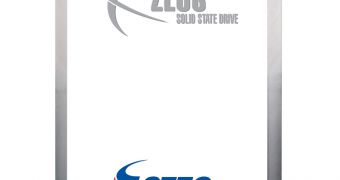The SSD market is one of the fastest growing businesses in the computer industry and this type of growth hasn't been seen since the Serial ATA interface or the PCI-Express interface first appeared. And since companies such as Intel, SanDisk, Transcend and others have announced 64, 128, even 160GB SSD drives, there had to be somebody to come and top their offerings, but the only thing is that you would expect the company to come and do this and thus it would become, well, better known.
The company, STEC Inc., has extended the Zeus-IOPS SSD family with the 256 and 512GB versions. On one interesting fact, STEC mentioned that their SSDs access information in microseconds, as opposed to normal hard drives which do it in milliseconds. But the main thing about SSD drives, up until now, is that aside from their really low access time, which allowed programs to open up faster, and computer to boot-up quicker, their transfer rates were way down, compared to normal hard drives, not to even mention SCSI drives. But apparently STEC got past this little problem, and boy, did they get over to do it or what, their SSD drives can perform 52.000 sustained read IOPS and 18.000 sustained write IOPS. That is a lot, and coming to consider that it allows for a sustained sequential read of 200MB/s and 100MB/s sustained sequential write, the drives really give normal hard drives, and in the near future even SCSI drives a run for their money. The drives also come in a 2.5-inch form factor, have a dual port fiber channel interface running in full duplex at 2Gb/s and an operational power consumption of 500mA. That means you can also power these darlings from the good old USB port, giving you an option of a very fast external SSD.
Patrick Wilkison, vice president of marketing and business development at STEC said: "STEC focuses on breakthrough technologies that solve major challenges. The Zeus-IOPS SSD will alleviate the concerns OEMs and HDD manufacturers have with both the scalability of enterprise aerial densities as well as the sustained drive speeds. STEC will continue to introduce advanced storage technologies to meet the demands of our important customers and their future applications.''

 14 DAY TRIAL //
14 DAY TRIAL //